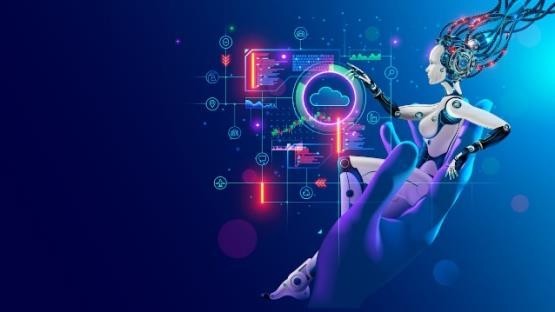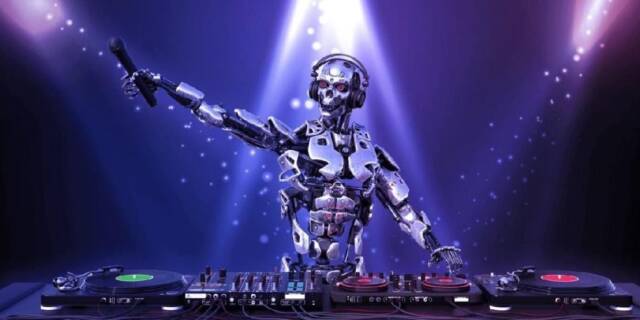The world of music composition is undergoing a profound transformation, driven by the rapid advancements in artificial intelligence (AI) technology. As AI becomes increasingly sophisticated, it is taking on a pivotal role in reshaping the future of music. This article explores the myriad ways in which AI is being employed in music composition and delves into the implications and potential of this groundbreaking technology in the music industry. If you’re curious about the cutting-edge algorithms that are redefining the future of music, read on.
Table of Contents
Evolution of AI in Music Production
Over the years, we have witnessed a remarkable evolution in the use of AI in music composition. It all began with algorithmic composition, where AI algorithms were used to generate musical patterns and structures based on predefined rules and parameters. This opened up endless possibilities for creativity, enabling composers to experiment with new sounds and ideas.
However, the true breakthrough came with the introduction of machine learning algorithms in music composition. By analyzing vast amounts of musical data, AI systems can now identify patterns, predict trends, and even generate original compositions that imitate the style of famous composers. This ability to learn from existing music and create something new has truly transformed the creative process for musicians and composers.
As AI continues to advance and become more sophisticated, we can only imagine the incredible possibilities that lie ahead for music composition. From personalized music recommendations to AI- assisted collaboration tools, the future of music is set to be shaped by the power of AI.
Benefits of AI in Music Composition
In this section, we will explore the numerous benefits that AI brings to the field of music composition. With the advanced algorithms and machine learning capabilities of AI systems, musicians and composers can enjoy a range of advantages that enhance their creative process.

Saving Time
One of the key benefits of AI in music composition is the ability to save time. AI algorithms can quickly generate original compositions and musical ideas, freeing up valuable time for artists to focus on refining and adding their personal touch to the music. This efficiency allows musicians to explore multiple ideas and experiment with different styles and genres.
Source of Inspiration
Additionally, AI can serve as a valuable source of inspiration. By analyzing vast amounts of musical data, AI systems can identify patterns and trends that may have gone unnoticed by human composers. This valuable insight can spark new ideas and provide fresh perspectives, pushing the boundaries of creativity in music composition.
Collaboration and Experimentation
Furthermore, AI opens up opportunities for collaboration and experimentation. With AI-assisted composition tools, musicians can collaborate with AI systems to create unique compositions. By combining human talent with the computational power of AI, artists can explore uncharted territories and create music that pushes the boundaries of traditional composition.
Democratizing Music Composition
Lastly, AI has the potential to democratize music composition. With user-friendly AI tools and platforms, aspiring musicians and composers can access advanced composition features, regardless of their technical skills or musical training. This inclusivity enables a wider range of individuals to express their creativity through music composition, fostering a more diverse and vibrant music landscape.
In conclusion, AI brings a multitude of benefits to the field of music composition. From saving time and providing inspiration to facilitating collaboration and democratizing composition, the role of AI in shaping the future of music composition cannot be overlooked.
Cutting-Edge Algorithms Shaping the Future of AI in Music Composition
In this section, we will delve into the cutting-edge algorithms that are shaping the future of music composition. AI systems are revolutionizing music creation by leveraging advanced algorithms that have the ability to generate compositions that mimic the style and characteristics of different composers and genres.

Generative Adversarial Networks (GANs)
One fascinating algorithm is the Generative Adversarial Network (GAN). GAN algorithms consist of a generator and a discriminator. The generator generates music based on a set of input parameters, while the discriminator evaluates the generated music against a training dataset. This feedback loop enables the system to continuously improve and create compositions that are almost indistinguishable from those created by human composers.
Recurrent Neural Networks (RNNs)
Another groundbreaking algorithm is Recurrent Neural Networks (RNNs). RNNs analyze the temporal dependencies in music, allowing AI systems to generate melodies and harmonies that have a sense of continuity and coherence. By learning from large amounts of musical data, RNNs can compose music that adheres to the principles of musical theory while also incorporating innovative and unexpected elements.
Melodies, Chord Progressions, and Lyrics
Additionally, there are algorithms that focus on generating melodies, chord progressions, and even lyrics. These algorithms use techniques such as Markov chains and natural language processing to analyze and understand the structure and semantics of music. By doing so, they can generate compositions that possess the intricacies and nuances of human-created music. These cutting-edge algorithms are revolutionizing the composition process by providing musicians and composers with new tools and possibilities. They not only streamline the creative process but also expand the boundaries of what is considered possible in music composition
AI vs. Human Composers: Complementing Creativity with Technology
While AI systems have made significant progress in music composition, the question arises: can they replace human composers? The truth is, AI algorithms are not here to replace human creativity but to complement it. The role of AI in music composition is to act as a tool that enhances and expands the creative capabilities of human composers.
AI algorithms are proficient at analyzing vast amounts of musical data and generating compositions based on predefined parameters. This can be especially useful for musicians and composers who may be looking for inspiration or seeking assistance in generating new ideas. AI can provide them with a starting point, a foundation on which they can then build and shape their own unique musical creations.
Furthermore, the collaboration between humans and AI can lead to innovative and unexpected results. By combining the creative intuition of human composers with the analytical capabilities of AI algorithms, new genres, styles, and techniques can emerge. This collaboration can push the boundaries of music composition, fostering experimentation and artistic growth.
However, it is essential to recognize and appreciate the emotional depth and personal expression that human composers bring to their music. The human touch cannot be replicated by algorithms alone. The nuances, emotions, and personal experiences that humans infuse into their compositions are what truly make music a powerful and relatable art form.
In conclusion, AI systems are not meant to replace human composers but rather to assist and enhance their creative process. The collaboration between humans and AI algorithms has the potential to reshape the future of music composition, ushering in a new era of innovation and artistic exploration.
Read More: How To Use ChatGPT in Mobile
Challenges and Ethical Considerations for AI in Music Composition
While the integration of Categories Uncategorized
